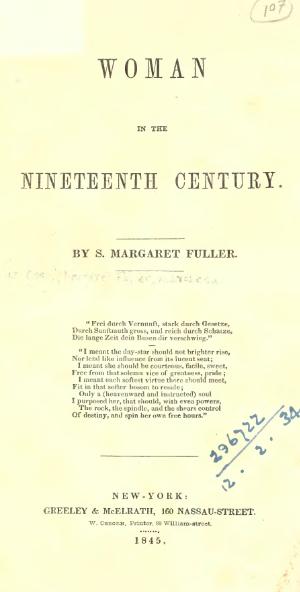- “Ten Days in a Mad-House is a book written by newspaper reporter Nellie Bly and published by Norman Munro in New York City in 1887. The book comprised Blyʼs reportage for the New York World while on an undercover assignment in which she feigned insanity to investigate reports of brutality and neglect at the Womenʼs Lunatic Asylum on Blackwellʼs Island.”
From Wikisource:
- “The Jungle is a 1906 novel written by author and socialist journalist Upton Sinclair. It was written about the corruption of the American meatpacking industry during the early 20th century. The novel depicts in harsh tones the poverty, absence of social programs, unpleasant living and working conditions, and hopelessness prevalent among the ‘have-nots,’ which is contrasted with the deeply rooted corruption on the part of the ‘haves.’”
- “Woman in the Nineteenth Century is a book by American journalist, editor, and women’s rights advocate Margaret Fuller. Originally published in July 1843 in The Dial magazine as ‘The Great Lawsuit. Man versus Men. Woman versus Women,’ it was later expanded and republished in book form in 1845.”
- “The basis for Fuller’s essay is the idea that man will rightfully inherit the earth when he becomes an elevated being, understanding of divine love. There have been periods in time when the world was more awake to this love, but people are sleeping now; however, everyone has the power to become enlightened. Man cannot now find perfection because he is still burdened with selfish desires, but Fuller is optimistic and says that we are on the verge of a new awakening. She claims that in the past man, like Orpheus for Eurydice, has always called out for woman, but soon will come the time when women will call for men, when they will be equals and share divine love.”
Ellen Bliss Talbot was a professor of philosophy at Mount Holyoke College from 1898 to 1932. From Wikisource:
“According to Dorothy Rogers and Therese B. Dykeman… ‘[Talbot] had a successful academic career, chairing Mount Holyoke’s philosophy department for thirty-two years and teaching part-time for several years after retirement. She published just three books, all on Johann Gottlieb Fichte (1898, 1899, 1906), in addition to her considerable number of articles in the Philosophical Review, Mind, and the American Journal of Psychology. Her commitment to women’s education at Mount Holyoke was unwavering, helping to ensure that the philosophy curriculum met the expectations of her fellow academicians as philosophy established itself as a profession.’ From ‘Introduction: Women in the American Philosophical Tradition 1800–1930,’ in Hypatia 19:2 (Spring 2004): viii-xxxiv.”





